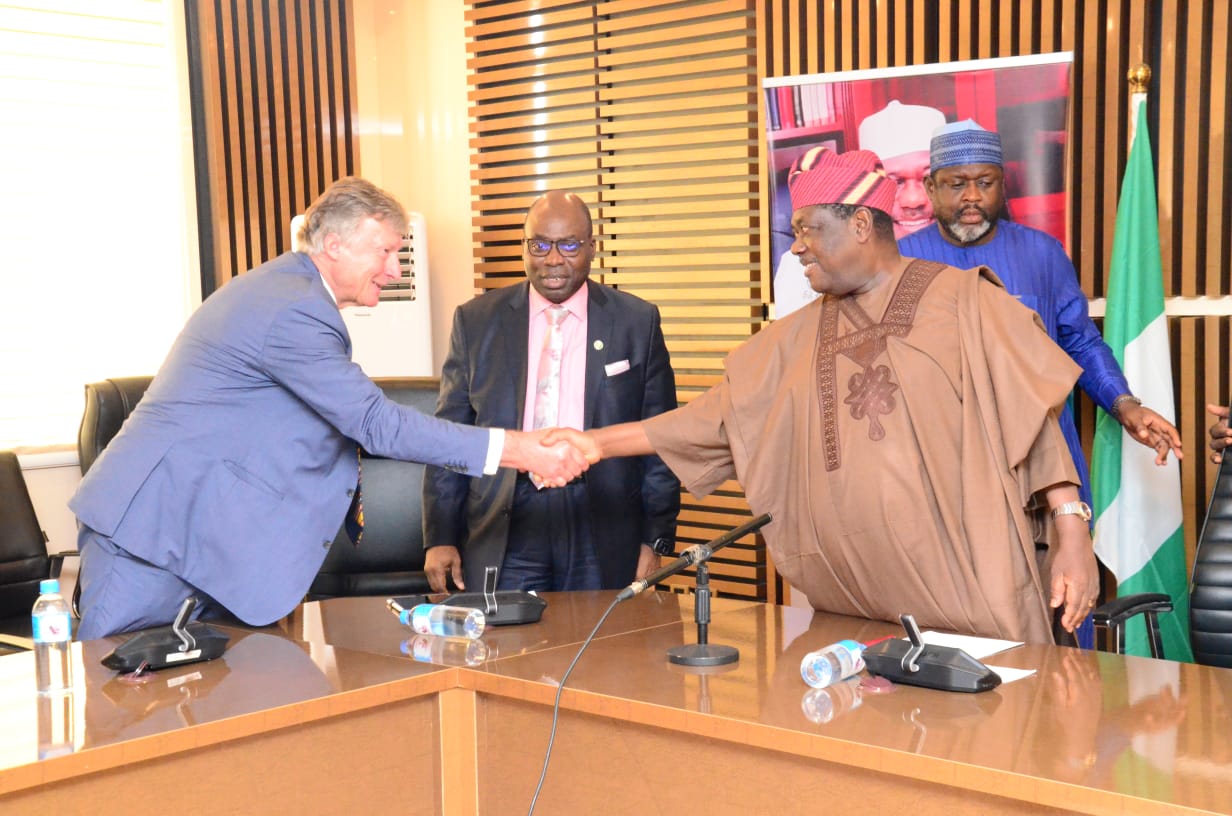Nigeria, through its foremost anti-corruption body, the Independent Corrupt Practices and Other Related Offences Commission (ICPC), and the International Anti-Corruption Academy (IACA), have agreed to collaborate on training and other areas of mutual benefits in the drive to mitigate corrupt practices.
The idea of the collaboration was mooted during the ongoing two-day working visit of the Dean and Executive Secretary of IACA, Thomas Stelzer, to Nigeria.
At a meeting with the Secretary to the Government of the Federation (SGF), Mr. George Akume, on Wednesday, the Chairman of ICPC, Professor Bolaji Owasanoye SAN, OFR, stated that Mr. Stelzer’s visit was in furtherance of operationalizing the Memorandum of Understanding (MOU) which ICPC and IACA signed in December 2021 on how to explore areas of mutual benefits.
“ICPC has been positioning itself as a leading capacity-building institution with its Anti-Corruption Academy of Nigeria (ACAN), not just in Nigeria, but within the West African sub-region and beyond. We have sought the collaboration of IACA, which is the International Anti-Corruption Academy based in Vienna, to work together to expand the horizon and further leverage Nigeria’s role and position in this area.
“In furtherance of this, Mr. Thomas Stelzer decided to visit Nigeria to evaluate our facilities, look at our existing programmes, and consider whether there are other areas of expansion or interest that we can work with, and of course, to solicit support for the academy.
“We hope to be able to collaborate with IACA in some of its training programmes, or in developing training programmes for this region, West African sub-region, sub-Saharan Africa, and indeed Africa on anti-corruption issues for which ACAN is a leading institution in capacity building in Africa”.
The ICPC boss also expressed the readiness of the Commission to continue to take advantage of IACA’s capacity-building programmes for its officers, saying the Commission would explore the possibility of accessing grants and having officers from ICPC on secondment to IACA for one or two years as a learning curve, as part of exchange programs.
“One or two officers have already been nominated this year to attend IACA training programmes. In this, we can collaborate with IACA, and we can learn some of the measures and strategies. So, this is a long-term vision for at least under my watch for pushing this collaboration, and we’re happy that Dean Seltzer is here as part of that initiative.”
In his remark, the Dean and Executive Secretary of IACA, Thomas Stelzer, noted that Nigeria had been a partner in progress with IACA for more than ten years and that the International Academy will ever be ready to offer technical assistance on capacity building to practitioners facilitating the implementation of the United Nations Convention against Corruption.
“The implementation of UNCAC is a huge achievement because it is the only legal instrument that allows us to fight corruption based on the rule of law globally”.
Continuing, Stelzer said, “Nigeria has been a strong partner in the past before COVID, and COVID was a rupture, and a lot of things came down a little bit, so this is one of the purposes of my visit here, to see how we can reinvigorate our cooperation, what we can do for you, what you request from us and how we can work with your institution in our global agenda of anti-corruption.”
“Now, we have been discussing this morning how to cooperate in real terms with the Academy. We have come up with several good approaches, which we are working out right now based on our understanding that we concluded with the Commission at the last conference of state parties. We are looking at two aspects here, the national aspect, Nigeria as one of our lead partners, but also, of course, Nigeria as the regional hub for many initiatives. ECOWAS has 15 countries, so how can we bring our services to fruition in this regional context, whether it can interest you to maybe consider an anti-corruption initiative within ECOWAS so that we can scale up our delivery capacity here.” he said.
While responding, the Secretary to the Government of the Federation, Mr. George Akume, stated that the visit of Mr. Stelzer to Nigeria was a welcome and encouraging idea to Nigeria’s anti-corruption agencies, just as he assured that the administration of President Bola Ahmed Tinubu was ready to stamp out corruption in the country.
“You are in Nigeria at this time when we have a new government in place, a government that is also very determined to stamp out corruption in our country. So far, certain measures have been taken to check the scale of corruption. The removal of subsidies in PMS is one of them. The subsidy regime in our country was a monster, and the courage to confront this monster was lacking. But this present government has been confronting it, and it has been defeated. What the government is doing now is putting in place other things to ensure that citizens are not subject to the harshest of punishments. After all, the subsidies they got extended to this party.”
Earlier, the Provost of the Anti-corruption Academy of Nigeria (ACAN), Professor Babawale Olatunde, speaking during the inspection tour of ACAN facilities by the Dean, noted that the relationship between ACAN and IACA had been very cordial just as he expressed hope that the collaboration between the two bodies would further strengthen the strategies of the anti-corruption fight.
“There is a lot that we can do together as partners in progress in the fight against corruption. There’s a lot in terms of manpower training and other areas, and I believe this particular visit will allow us to tap from your rich resource base of the International Anti-Corruption Academy. We are also ready and capable to serve as the hub of anti-corruption training in West Africa, and I hope you can help us facilitate that”.


